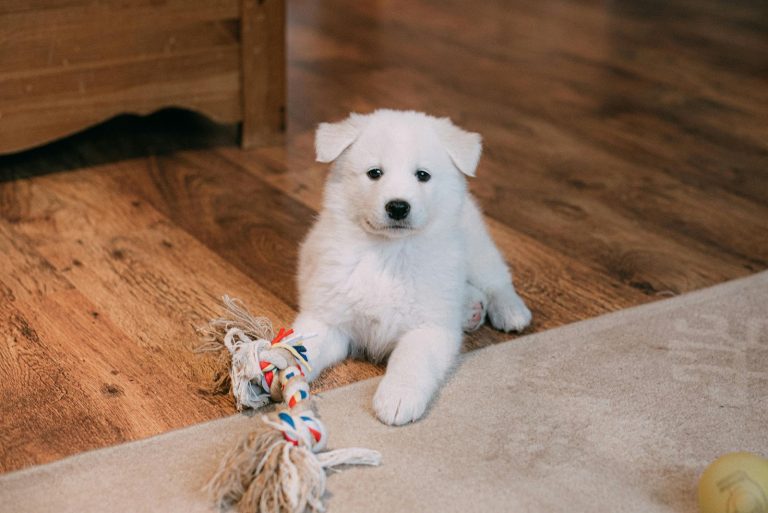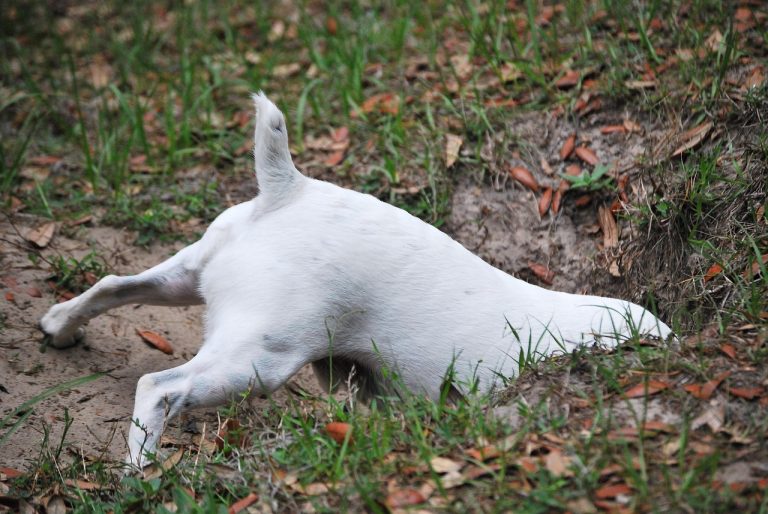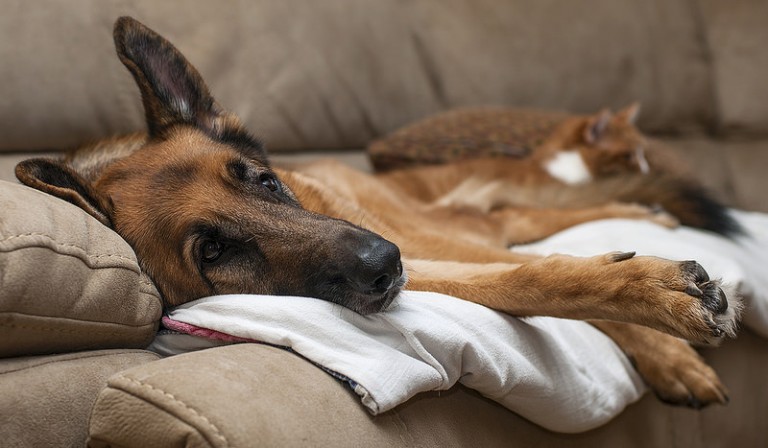Can Cats Tell When Another Cat Is Sick or Dying?
Cats may lick each other, sometimes offering comfort, or avoid ill counterparts. It might have something to do with their feline instincts.
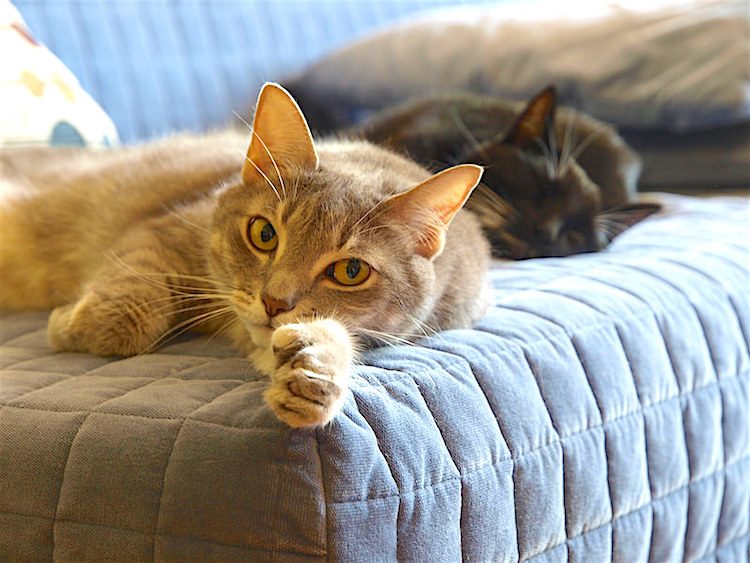
Can cats tell when another cat is sick or dying?
Yes, it certainly seems so. And, as I’ll explain in this article, a cat’s reactions to death or sickness can vary quite a bit.
Actually, I used to believe that all cats would turn their backs on other cats who were sick or dying. This response probably dates back to when they all lived in the wild and the presence of a sick cat could have led a predator to the colony.
Having seen some of my own cats act this way, I was sure I was on to something.
But the truth is a lot more complicated.
“In a multi-cat house, healthy cats may behave in various ways toward the sick cat,” says Debra Levy.
“Some may pick up on their parent’s emotional distress and become upset as well. Some may appear withdrawn and depressed, and may even cry out or try to entice the sick cat to engage in activity. Some cats may seem not to care about the sick cats, while others may even seem happy and desire even more affection from their parents.”
In other words, one cat’s reactions to another cat’s sickness or death can be just as varied as ours are.

Don’t leave your pet’s safety to chance
Sign up for Petful recall alerts today.

When the Cats Keep Vigil Over a Dying Cat
When Solstice, my ruddy Abyssinian, was dying of kidney failure a few years ago, the other cats rallied round her.
They seemed to understand that she was ill, but they took it all in their furry stride.
They’d sit with her on the counter, watching the birds at the feeders, or sun themselves with her in the breezeway.
Recently I saw our cats behave similarly toward Topaz, our almost 15-year-old flamepoint Siamese. Topaz, who had both kidney and heart issues, was treated with all the respect due an elder.
Phoebe, the fluffy self-appointed matriarch of the clan, looked after him, checking on him and sometimes even washing him.
On some level, the cat seemed to sense that the other cat was dying, and Phoebe was keeping vigil with him, giving him what moral support she could. A hospice nurse couldn’t have been more caring and compassionate.
And she must’ve laid down the law to the other cats in our household because when she was otherwise busy, a couple of the younger guys would be curled up next to the dying cat sharing their body heat with him.
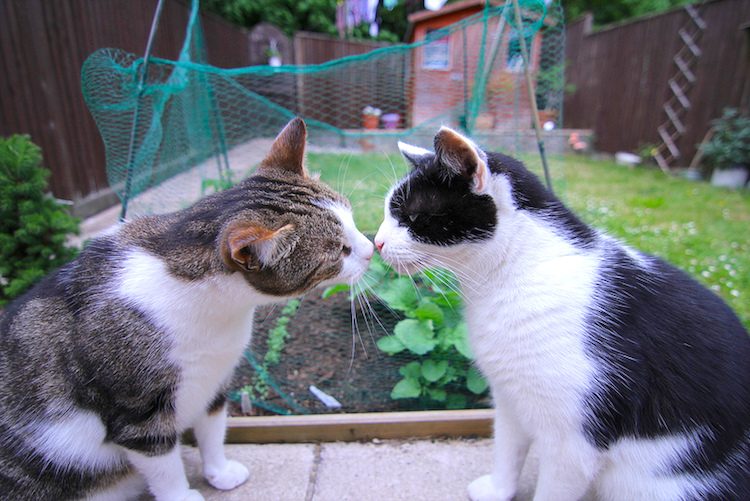
Big Cats, Little Cats
In 1991, National Geographic produced a documentary called Caressing the Tiger.
One of the more intriguing segments focused on a study that showed striking similarities between cat colonies and lion prides.
Barn cats shared mothering responsibilities and even nursed one another’s kittens, as lionesses did. So far, so good. Unfortunately, some of the parallels were far darker.
Tom cats, like their lion cousins, often killed kittens fathered by another male. Without her litter, the mom cat would go back into heat, and the tom cat would mate with her, thus ensuring that his line would be continued.
Since then, it has been discovered that cheetahs, too, are very social.
Cheetah siblings hunt and hang out together. What’s more, according to Messy Beast blogger Sarah Hartwell in her post on “The Unsociable Cat,” cheetah brothers will actually “take solitary females hostage until she is receptive to being mated. All the brothers will mate with her over a period of days.”
Now, back to domestic cats, who are often “playing, sleeping and even hunting together,” according to Hartwell.
She adds that many cats “form close attachments to other cats and even to other domestic animals.”
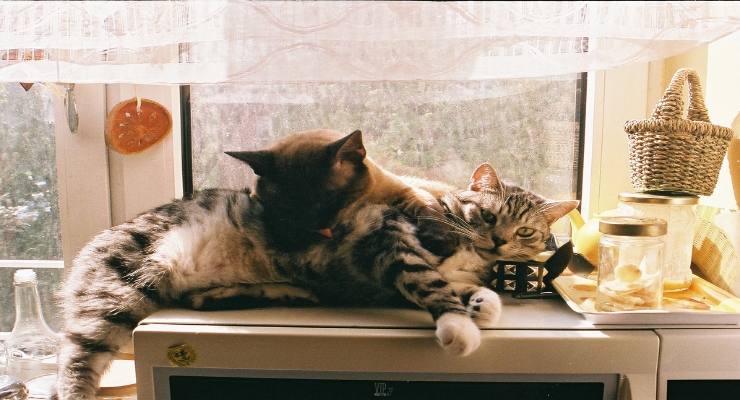
Multi-Cat Households
In some ways, having a multi-cat household is like being an observer in a research lab.
You have a certain number of cats interacting with one another — or not. They’re aware of you and they love you, but let’s face it: You’re often on the periphery of their feline dramas.
In some ways, the multi-cat household runs along the same lines as a feral cat colony. We know now that feral cats are much more social than they’ve been given credit for. Their relationships “are complex, with stronger affiliative relationships between some cats and less affiliation with others,” according to International Cat Care (ICC).
Within a feral cat colony, there are close-knit friends. And these feral friends spend more time with one another, according to veterinary behaviorist Dr. Sharon L. Crowell-Davis, DVM, PhD, DACVB.
These cat friends in the wild “can be found together not only at sites of desirable resources, such as good resting places, but also at various locations and times throughout the day,” Dr. Crowell-Davis says.
Yes, Sometimes Cats Tell When Another Cat Is Sick or Dying
OK, back to domestic cats …
Generally, domestic cats interact pretty well with one another, showing the kind of gentleness and understanding that I alluded to earlier.
But once in a while, I see another side of their feline instincts.
Years ago, we had a Siamese kitten, Houdini II, who had been born with an atonal bladder and bowels, resulting in chronic constipation. Almost none of the other cats would go near him. And when he finally had to be euthanized 11 days later, you could practically hear the collective sigh of relief.
To the other cats, he was a threat to the group. Had they been living in the wild, his presence would have attracted predators. They would probably have abandoned or even destroyed him.
I saw a similar ostracism happen when yet another cat was dying of cancer. The other cats knew she was ill and kept their distance.
“In most cases where one housemate is on the way out, he or she will be protected by the others,” says Dr. Thomas D. Morganti, DVM, of Avon Veterinary Clinic in Avon, Connecticut. “But cancer might be different because it definitely puts out an odor that animals can sense.”
But Dr. Morganti still believes that the caregiving or mothering instinct in cats is “probably more the rule than the exception.”
Do Cats Grieve After Another Cat Dies in the House?
Again, the answer seems to be yes — sometimes, they do grieve.
Dr. Arnold Plotnick, DVM, ACVIM, still remembers a grief-stricken cat he met many years ago.
The cat had seen her littermate killed by a neighbor’s dog and was “huddled on the exam table, disinterested, inconsolable,” he recalls.
“I am often asked whether I think cats grieve or mourn the loss of a feline companion,” Dr. Plotnick says. “I certainly feel that they do, but cats cannot speak, and we can only guess at what their true emotions might be at any given time.”
What it all comes down to is that cat group dynamics are much more complicated than we realize.


